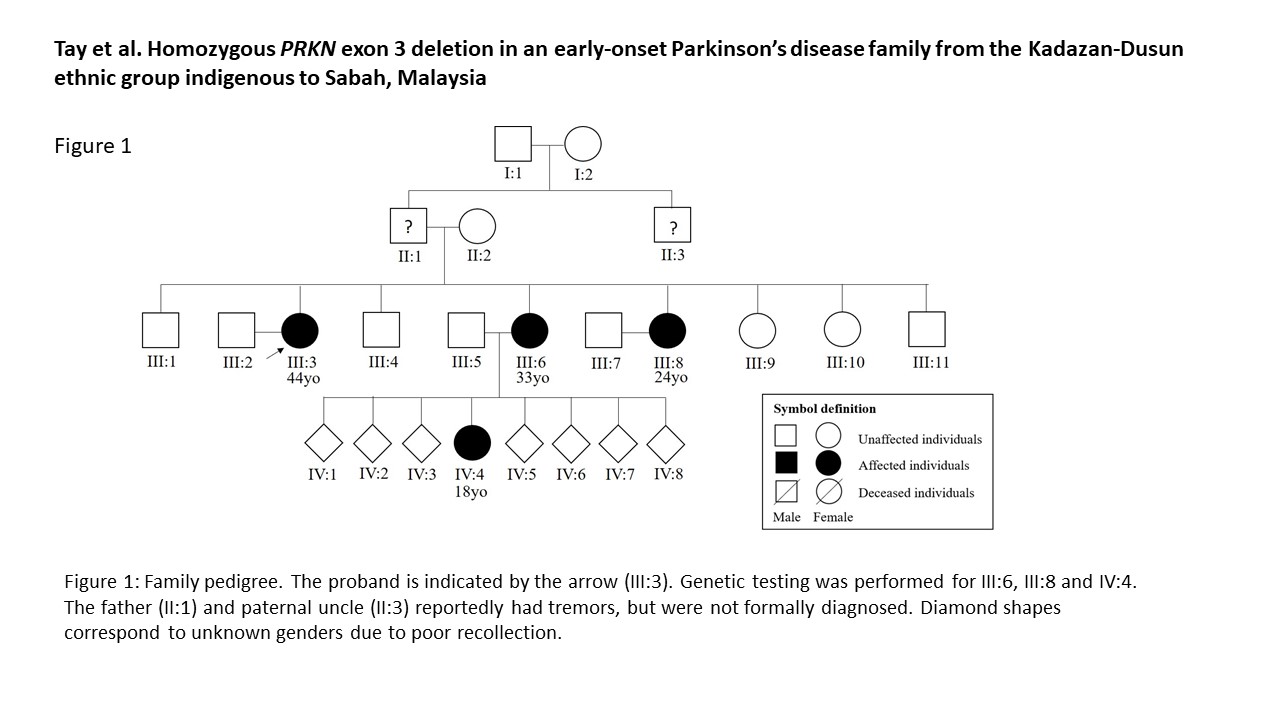Category: Parkinson's Disease: Genetics
Objective: To determine the causal gene for early-onset Parkinson’s disease (PD) in a Malaysian family of Kadazan-Dusun ethnicity.
Background: Among Asian populations, relatively little is known regarding PD genetics in patients from Southeast Asia (SEA), Central Asia and Oceania [1]. Malaysia, located within SEA, is a multi-ethnic country with a number of indigenous populations and studies on PD in these populations is limited [2]. The Kadazan-Dusun ethnic group is one of the largest indigenous minorities in Malaysia, and are mainly based in the state of Sabah in the island of Borneo. The prevalence of PD in this population is not known. Here, we present the clinical and genetic findings of a Kadazan-Dusun family with multiple members presenting with early-onset PD (Figure 1).
Method: Three affected sisters and a daughter were assessed by neurologists. Genomic DNA was extracted from peripheral blood samples using standard techniques. Multiplex ligation-dependent probe amplification (MLPA) was performed using the SALSA MLPA® Probemix P051 Parkinson mix 1 (MRC Holland) kit, and the result verified using polymerase chain reaction (PCR).
Results: The three affected sisters had age of symptom onset between 22-44 years. Although not formally diagnosed, their father and a paternal uncle also displayed tremors. One of the sister’s daughters was also affected, with an age of PD symptom onset at 18 years. There was no known consanguinity (although this is a relatively isolated ethnic group whose members may share distant ancestry). All four subjects diagnosed with PD in this family were found to be homozygous for PRKN exon 3 deletion; c.(171+1_172-1)_(412+1_413-1)del. Segregation analysis was not performed as DNA was unavailable from unaffected family members.
Conclusion: Genomic deletion of PRKN exon 3 is a frequent cause of autosomal recessive early-onset PD (http://www.mdsgene.org) [3]. This deletion has been reported worldwide, including in patients of Asian ethnicity from Japan and China. To our knowledge, this is the first report of PD genetic findings in the Kadazan-Dusun population. This is thus an underrepresented population that deserves further study.
References: [1] Lim SY, Tan AH, Ahmad-Annuar A, Klein C, Tan LCS, Rosales RL, Bhidayasiri R, Wu YR, Shang HF, Evans AH, Pal PK, Hattori N, Tan CT, Jeon B, Tan EK, Lang AE. Parkinson’s disease in the Western Pacific Region. Lancet Neurol. 2019 Sep;18(9):865-879. Doi: 10.1016/S1474-4422(19)30195-4. [2] Tan AH, Lohmann K, Tay YW, Lim JL, Ahmad-Annuar A, Ramli N, Chin YT, Mawardi AS, Azmi K, Aziz ZA, Puvanarajah SD, Bauer P, Klein C, Rolfs A, Lim SY. PINK1 p.Leu347Pro mutations in Malays: Prevalence and illustrative cases. Parkinsonism Relat Disord. 2020 Aug 19;79:34-39. Doi: 10.1016/j.parkreldis.2020.08.015. [3] Kasten M, Hartmann C, Hampf J, Schaake S, Westenberger A, Vollstedt EJ, Balck A, Domingo A, Vulinovic F, Dulovic M, Zorn I, Madoev H, Zehnle H, Lembeck CM, Schawe L, Reginold J, Huang J, König IR, Bertram L, Marras C, Lohmann K, Lill CM, Klein C. Genotype-Phenotype Relations for the Parkinson’s Disease Genes Parkin, PINK1, DJ1: MDSGene Systematic Review. Mov Disord. 2018 May;33(5):730-741. doi: 10.1002/mds.27352.
To cite this abstract in AMA style:
YW. Tay, JL. Lim, YK. Chia, AH. Tan, SY. Lim, A. Ahmad-Annuar. Homozygous PRKN exon 3 deletion in an early-onset Parkinson’s disease family from the Kadazan-Dusun ethnic group indigenous to Sabah, Malaysia [abstract]. Mov Disord. 2021; 36 (suppl 1). https://www.mdsabstracts.org/abstract/homozygous-prkn-exon-3-deletion-in-an-early-onset-parkinsons-disease-family-from-the-kadazan-dusun-ethnic-group-indigenous-to-sabah-malaysia/. Accessed April 2, 2025.« Back to MDS Virtual Congress 2021
MDS Abstracts - https://www.mdsabstracts.org/abstract/homozygous-prkn-exon-3-deletion-in-an-early-onset-parkinsons-disease-family-from-the-kadazan-dusun-ethnic-group-indigenous-to-sabah-malaysia/

